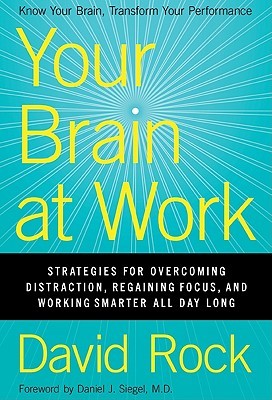 Want to learn more about your brain’s natural limitations — and how to work around them?
Want to learn more about your brain’s natural limitations — and how to work around them?
David Rock‘s Your Brain at Work is the book for you.
While our household loves what I call “recreational neuroscience reading,” the genius of Rock’s book is its accessibility: no nerd cred required. He makes learning about the brain feel both exciting and practical through fun, easy-to-parse language. While ADHD is not mentioned specifically, ADHD’ers will receive game-changing insights into why we behave like we do.
Your Brain at Work employs a theatre metaphor to explain the core concepts. Each chapter opens with a new scene featuring a fictional couple, Emily and Paul, as they navigate various professional and personal challenges. Take One shows Emily and Paul faltering and escalating interpersonal situations to the point of near disaster. Rock walks us through the hows and whys of these failures using theatre language — actors, stage, lights, director — to turn neuroscience into a subject anyone can readily understand. Take Two applies what we’ve learned, portraying Emily and Paul putting their brains to work for a confidence-boosting personal victory.
Despite not mentioning ADHD, Rock seems to have written Your Brain at Work with us in mind. Not only does the theatre metaphor make the subject matter fun and easy to digest, the book is exceptionally well-organized. Rock opens by outlining what we can expect to learn, making it easier to direct our focus. We enter each chapter with a clear idea of what it’ll be about and wrap it up with a nice conclusion at the end.
Your Brain at Work is a critically important read for ADHD adults. The more we know about the human brain’s limitations — and Rock hits on many ADHD sore spots — the easier it is to work around them.
My husband read Your Brain at Work, too, and it gave us new language to navigate challenging conversations. Of the theatre metaphor, he told me, “I hope you’ll use it to tell me when you notice things — like if I have too many actors on my stage.” After attempting (unsuccessfully) to win me over in a disagreement, he later said, “I should never have tried to sell you on that. As soon as I started talking about it, I could tell you were in an away state.”
Don’t know what we’re talking about? You will, and even if it only provides hindsight after an argument, that’s progress.
Rock shows us again and again that with enough brain savvy, we can salvage interactions even after they’ve crashed and burned. Most chapters’ Take One scenes jump off from the previous Take One — not the rosier Take Two. We see Emily and Paul reflecting on what went wrong, then summoning the wherewithal to do better in the next round.
Perhaps most valuable of all, Your Brain at Work introduces pragmatism to highly charged interactions. This helps us puzzle out why we drive others (and ourselves) crazy, and vice versa. We can use this knowledge to communicate reasonably and calmly.
Rock’s techniques and suggestions are a gold mine on their own, but we can read between the lines to understand why others do what they do — and why their behavior affects us like it does.
While the fussiness of the prefrontal cortex, among other things, can make Your Brain at Work feel like a depressing reminder of our deficiencies, it also empowers us to make the most of the resources we have. As we travel through the day with Emily and Paul, we learn to spot tipping points moment by moment. It’ll never feel easy, but Rock gives us hope that a few small changes and a little more knowledge will make it much less hard.
Hey there! Are you enjoying The ADHD Homestead?
Here's the thing: I don't like ads. I don't want to sell your attention to an advertising service run by the world's biggest data mining company. I also value my integrity and my readers' trust above all, which means I accept very few sponsorships/partnerships.
So I'm asking for your support directly. For the cost of one cup of coffee, you can help keep this site unbiased and ad-free.
Below you will find two buttons. The first lets you join our crew of Patreon pals and pledge monthly support for my work. Patrons also have access to my Audioblogs podcast. The second takes you to a simple donation page to pledge one-time or recurring support for The ADHD Homestead, no frills, no strings. Do whichever feels best for you!

